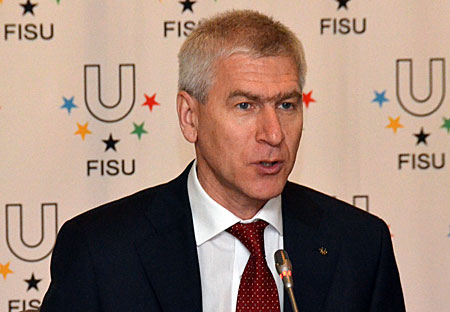BRUSSELS – At nine o’clock sharp, FISU President Oleg Matytsin opened the Executive Committee meeting, his first as newly elected President. Mr. Matytsin reflected on the candidatures of host cities for future Universiades and was confident some promising and strong bids will finally produce great Universiades. He also discussed the newly signed marketing partners and announced that some new partnerships will be signed in the coming weeks as more talks are still underway. “As all these companies are interested to invest in the future for our students, these partnerships will create more stability for the future”, the President commented.
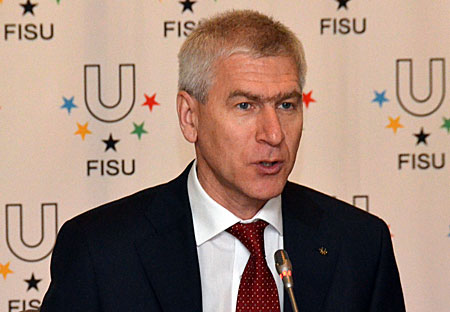 FISU President Oleg Matytsin opening the Executive Committee Meeting in Brussels
FISU President Oleg Matytsin opening the Executive Committee Meeting in Brussels
The FISU President gave the floor to 1st VP Leonz Eder and 1st Assessor Verena Burk to outline the future activities of the Development and Education Departments respectively. Verena Burk presented the proposals of the Educational Department, introducing the target groups and main topics, such as Values, Ethics and Anti-doping, Leadership, Health/Social Care, Volunteers, Dual career and Innovation. Leonz Eder dwelled on the further activities of the Development Department. A timeframe was set for the change of the brand name of the Continental Federations (CUSF). The final CUSF reports were received in January and their financial aspects are being checked. For the next Steering Committee, the CDSU will propose some projects that FISU wants to see implemented by CUSFs. As a new policy needs to be defined the launch for new NUSF projects was postponed to 2017. The idea was launched to organise once a year a seminar at the General Assembly of a CUSF or FISU, or during the FISU Forum, with one member of the FISU Executive Committee and one member of staff.
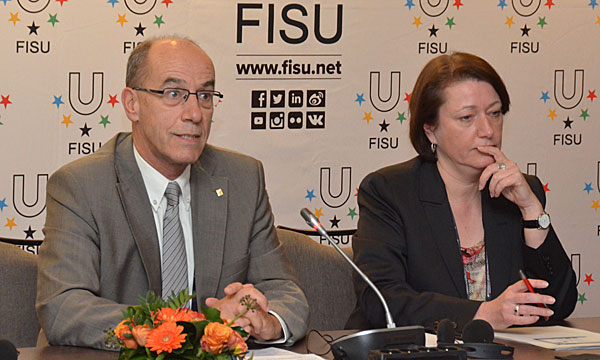 Leonz Eder, FISU First vice-President and Verena Burk, FISU 1st Assessor respectively in charge of the development and education which are closely linked whithin FISU
Leonz Eder, FISU First vice-President and Verena Burk, FISU 1st Assessor respectively in charge of the development and education which are closely linked whithin FISU
Treasurer Report
In his report, Mr. Bayasgalan noted that FISU is operating in challenging times. However, FISU luckily continues to organise its games in this difficult economic period but has borne significant burden in order to be able to stage its events. “To avoid a negative development, it is time to shift to a sustainable, anticipative and careful long term strategy model. For this purpose we need to prioritize the key activities and review those of secondary importance”, the Treasurer explained.
Secretary General/CEO Report
FISU SG/CEO Eric Saintrond gave a summary of his extensive report. The second part of 2015 that followed the Summer Universiade in Gwangju has been extremely busy with the preparation to the General Assembly in Lausanne and significant number of meetings and discussions with potential cities to hos
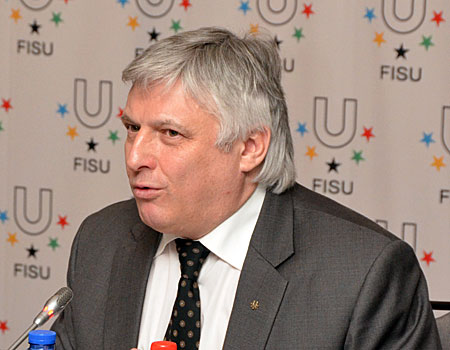 Eric Saintrond, FISU Secretary General/CEO
Eric Saintrond, FISU Secretary General/CEO
t the 2019 Summer Games. The Organisation of the General Assembly outside of the Universiade was a good move, however it generated
a number of administrative challenges. Regarding the FISU Technical Delegates in summer and winter sports, they have been appointed for a two years period now, and their mandate will be renewed in 2017 for the period of four years, which will avoid any break in supervision of World University Championships and Universiades. “The General Assembly was a great success even if the election’s day was extremely long for everyone, an
d I would like to thank all our member associations and members of the Committees for their patience”, the SG/CEO added. The Lausanne Assembly was also an opportunity for everyone to discover the City of Lausanne as well as the Campus of UNIL where FISU will have its headquarters from late 2017. “Together with the President and right away after the elections we have been involved in plenty of meetings and discussions related to the future of FISU. During those meetings we have made a number of proposals that are extremely important for FISU and its membership. We will also announce some very important news regarding our future events and new partners, and those good news items are encouraging us to continue our work in order to make FISU and the university sports movement stronger and stronger”, the SG/CEO said. Mr. Saintrond has presented the proposal to change the age limit of the FISU event participants which was accepted by the FISU Board. Indeed, an elaborated study has shown that the majority of the participants can be situated within the 19-25 age limit, representing 88% of the participants, with the age group of 22 peaking in these age brackets, which convinced the EC members to accept this proposal. The SG/CEO also underlined the recent marketing and sponsorship developments and presented one of the key projects: the FISU Global Strategy Project for the next decade. This project will generate ideas and procedures where and how FISU will continue its growth by defining strategic goals and actions. The long term project will involve the entire FISU Family as different Working Groups will be established.
Nominations New Committee Members
Next on the agenda were the nominations of the new members on the FISU Committees. You can find the list here.
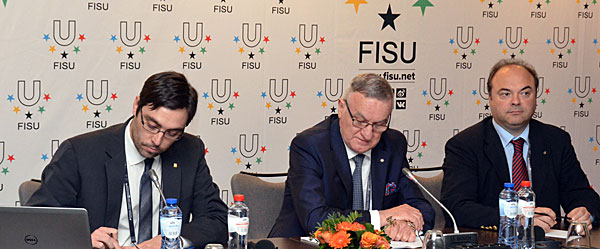
After the lunch break the WUC department presented its report and future developments for 2018 and 2020.
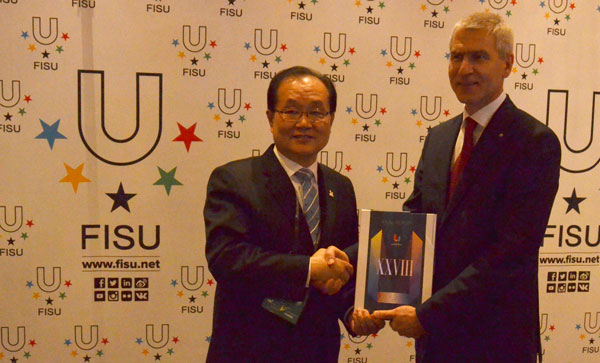 Mr Kim, President of the GUOC, giving the Gwangju Universiade Final Report to Oleg Matytsin
Mr Kim, President of the GUOC, giving the Gwangju Universiade Final Report to Oleg Matytsin
Next, the floor went to the delegates of the Organising Committee of the 2015 Gwangju Summer Universiade. The OC delegates presented their final report of these successful Games.Today’s session ended with a progress report of the 2016 FISU Forum.
C. Pierre, Press Officer
